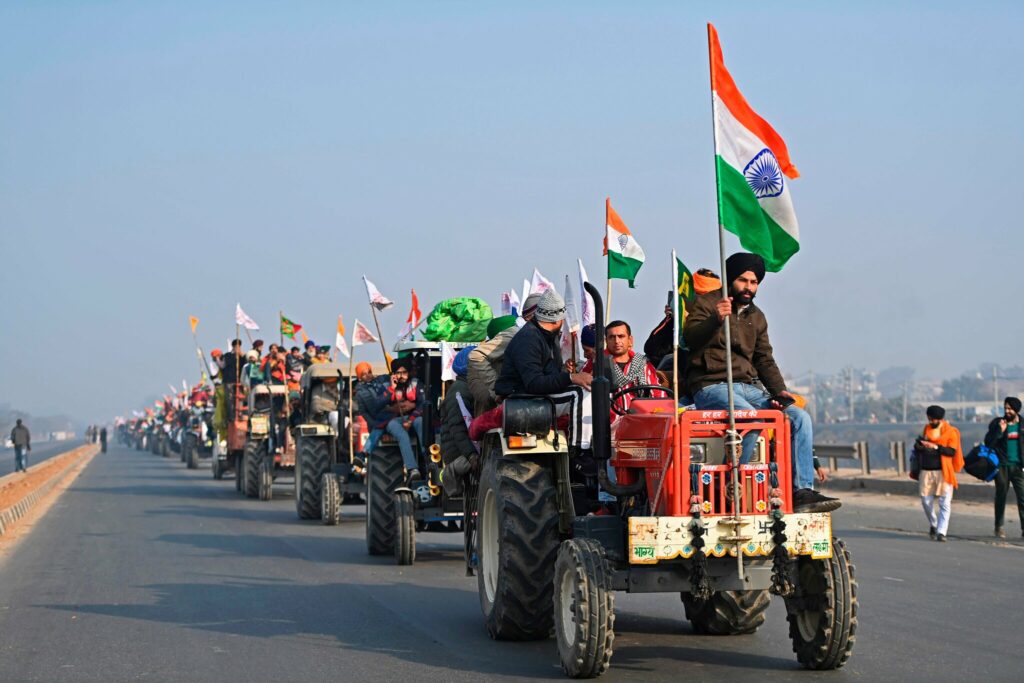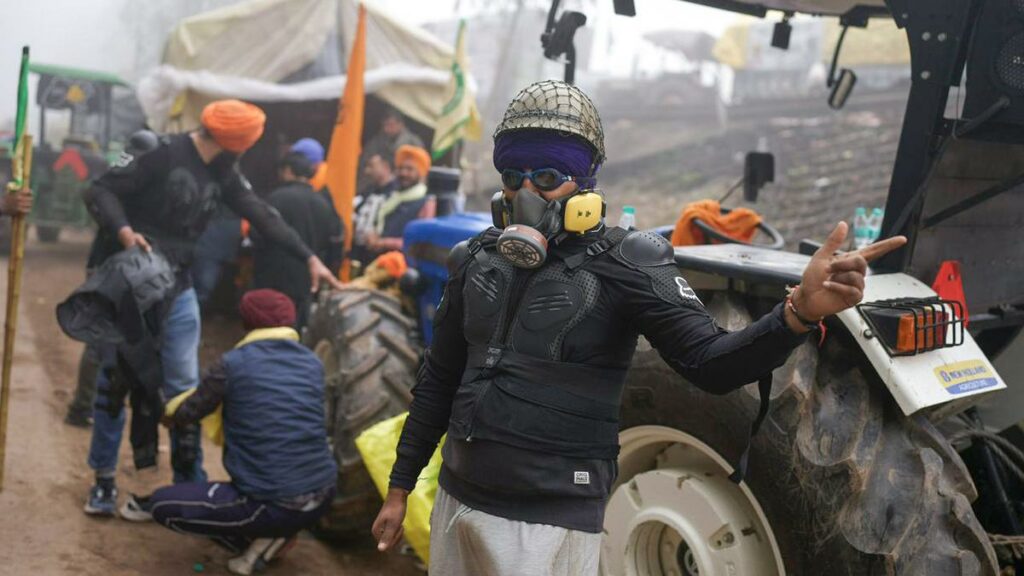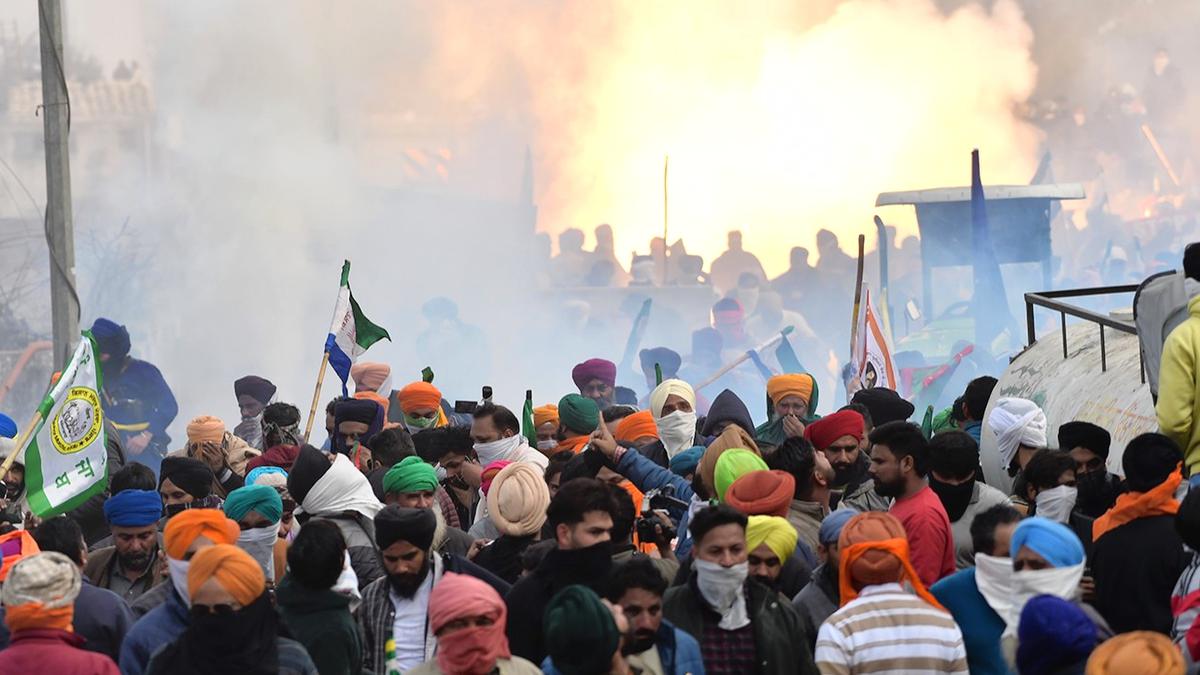Once more, the streets leading to Delhi witness a sea of determined faces as farmers from across the country gather under the banner of ‘Delhi Chalo,’ reigniting their fight against the Modi government’s farm laws. With memories of the tumultuous protests of 2020 still fresh, authorities in Haryana and Delhi stand guard, imposing stringent measures to prevent a resurgence of unrest.
Whereas at the Punjab-Haryana border, tensions have erupted, with clashes breaking out as farmers dismantle spikes along the Khanauri road. In response, police deployed tear gas shells at the Shambhu border, intensifying the confrontation. These events serve as stark reminders of the unresolved grievances propelling the ongoing movement.
Genesis of farmers’ protests
The seeds of the current farmer protests were sown during the introduction of the contentious farm laws by the Modi government. These laws, aimed at liberalising agricultural markets, faced vehement opposition from farmers who argued that they would lead to the dismantling of the existing support system and leave them vulnerable to exploitation by corporate interests.

The culmination of these concerns resulted in widespread protests across the country leading to the historic tractor rally in Delhi and the subsequent repeal of the laws.
What is the government doing?
Amidst escalating tensions surrounding the ongoing farmer protests, the government has made a plea for talking underscoring the significance of preserving peace. According to a recent report, Union Agriculture Minister Arjun Munda expressed the government’s readiness to participate in discussions following a round of talks on Monday.

In an attempt to address the concerns raised during previous protests, the government established a committee in July 2022 to address issues surrounding the minimum support price (MSP), intending to enhance its transparency and effectiveness. However, tensions have risen as farmer unions, including the prominent Samyukta Kisan Morcha, argue that they are not adequately represented on this committee.
The Samyukta Kisan Morcha (Non-Political) and the Kisan Mazdoor Morcha have reaffirmed their stance, emphasising that more than 200 farmer unions remain committed to pressing the Centre for their demands and persisting with their march towards Delhi, the report said further.
After farmer leaders rebuffed the government’s proposition regarding Minimum Support Prices (MSP), Union Minister Arjun Munda issued an appeal to the protesters, urging them to uphold peace. “We must progress from discussions to solutions… Our aim is to facilitate collective efforts towards finding a resolution and engaging in constructive dialogue on the matter,” the minister remarked on Tuesday, said a report.
Despite authorities’ efforts to curb their movement, as the situation unfolds, it becomes increasingly apparent that a lasting resolution to the grievances of farmers necessitates genuine and meaningful engagement between the government and agricultural communities. Failure to address these underlying issues risks perpetuating a cycle of unrest and discontent that could have far-reaching implications for India’s social and political fabric.
Understanding the core demands fueling the farmers’ protests
While the government is urging for discussions, it’s clear that there’s still a long way to go to find a peaceful solution. The farmers are sticking to their demands, showing their determination to fight for what they believe is right.
It can be seen that as farmers once again take to the streets, their demands echo familiar sentiments from the protests of 2020, primarily centred around securing a legal guarantee for the minimum support price (MSP) on crops. This renewed agitation underscores the farmers’ determination to ensure the protection of their margins by advocating for the incorporation of MSP into legislation.
Despite the repeal of the farm laws, the underlying issues that prompted the protests have not been fully addressed. Farmers continue to grapple with challenges such as inadequate income, mounting debts, and lack of access to markets and resources. The recent resurgence of protests underscores the persistent discontent among farmers and their determination to secure meaningful reforms.
Analysing the reports, it can be seen that as farmers once again take to the streets, their demands echo familiar sentiments from the protests of 2020, primarily centred around securing a legal guarantee for the minimum support price (MSP) on crops. This renewed agitation underscores the farmers’ determination to ensure the protection of their margins by advocating for the incorporation of MSP into legislation.
MSP serves as a crucial safety net for farmers, ensuring a minimum price for their 23 crops and protecting them from market volatility. However, the primary focus of procurement efforts is on staple crops like paddy and wheat, leaving farmers of other crops vulnerable to the uncertainties of market fluctuations.
Another key demand put forth by farmers is the alignment of MSP with the recommendations of the MS Swaminathan Commission. The Commission proposed setting MSP at 50 per cent above the cost of production, a measure aimed at ensuring adequate income for farmers. Farmers argue that implementing this recommendation is necessary to address the prevailing agrarian crisis and uplift the socio-economic status of farmers.
In addition to MSP, farmers are also demanding the withdrawal of legal cases filed against protesters during the previous agitations. Furthermore, they are calling for comprehensive supportive measures such as pension schemes for farmers, loan waivers, and withdrawal from international trade agreements that may adversely affect farmers’ interests.
Furthermore, amidst global pressure over agricultural subsidies, demands extend to reconsidering India’s stance within the World Trade Organisation.
Paving the way to sustainable agriculture for the future
The shifting dynamic in agriculture has already affected the farmers. Farmers, already grappling with mounting debts and inadequate income, found themselves facing unprecedented hardships as they struggled to sell their produce and sustain their livelihoods. The pandemic underscored the vulnerabilities inherent in India’s agricultural system and highlighted the urgent need for comprehensive reforms to build resilience and ensure food security in the face of future crises.
Amidst the ongoing protests and demands for policy reform, there is also a growing recognition of the need to prioritise environmental sustainability in agriculture. Climate change poses existential threats to agriculture, with extreme weather events, water scarcity, and soil degradation becoming increasingly prevalent. Farmers are advocating for sustainable agricultural practices that promote biodiversity, conserve natural resources, and mitigate the adverse impacts of climate change.
Amidst the ongoing protests and demands for policy reform, there is also a growing recognition of the need to prioritise environmental sustainability in agriculture. Climate change poses existential threats to agriculture, with extreme weather events, water scarcity, and soil degradation becoming increasingly prevalent. Farmers are advocating for sustainable agricultural practices that promote biodiversity, conserve natural resources, and mitigate the adverse impacts of climate change.
Agroecology, organic farming, and precision agriculture are emerging as viable alternatives to conventional farming methods, offering pathways towards resilient and environmentally friendly food systems. Integrating these practices into mainstream agriculture will not only benefit farmers but also contribute to global efforts to combat climate change and safeguard the planet for future generations.
When will we have an equitable agricultural system?
The questions remain the same, stemming from perceived unfulfilled promises by the government following the previous protests, as the farmers’ movement gains momentum once again, it serves as a poignant reminder of the deep-seated challenges facing India’s agricultural sector. The failure to address these grievances has fueled renewed discontent and mobilised farmers in their quest for substantive reforms.

The resurgence of farmers’ protests in India underscores the urgent need for comprehensive reforms to address the systemic challenges facing the agricultural sector. By addressing the demands of farmers and prioritising their well-being, policymakers can pave the way for a more inclusive, equitable, and sustainable agricultural system. Collaboration between government, civil society, academia, and the private sector will be essential for forging a path forward that ensures the long-term viability of Indian agriculture while safeguarding the livelihoods of farmers.
And as the protests continue, the spotlight remains firmly fixed on the government’s response and its willingness to engage meaningfully with farmers to address their concerns. The outcome of these negotiations will not only shape the future of agriculture in India but also hold broader implications for social cohesion and economic stability.
As stakeholders engage in dialogue and deliberation, it is imperative to heed the voices of farmers and work towards meaningful reforms that address the structural inequalities inherent in India’s agrarian landscape. Only through concerted efforts and genuine collaboration can we build a sustainable future for Indian agriculture, one that truly honours the invaluable contributions of our farmers.
As we navigate the complexities of the agrarian landscape, it is important and needful for all of us as a society, collectively to seize this moment as an opportunity to build bridges, foster dialogue, and work together towards a future where agriculture thrives, and farmers prosper.




